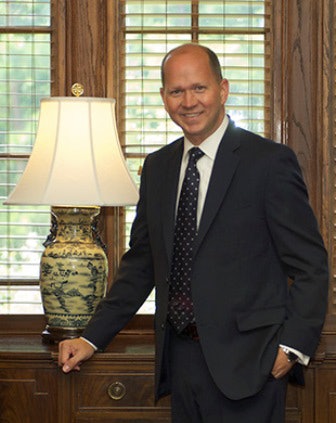 Joshua Newton is the University of Connecticut Foundation’s new president.
Joshua Newton is the University of Connecticut Foundation’s new president.STORRS Conn.—The University of Connecticut Foundation is bringing on a new president next week, but the outgoing leader who makes close to half a million dollars annually will continue to be paid through next June.
The foundation raises money for UConn’s endowment and other things including scholarships and athletic facilities. A capital campaign launched in 2009 has raised about $400 million toward a $600 million goal.
John Martin, who has been the foundation’s president since 2003, is being replaced by Joshua Newton, who served in a similar position at Emory University. The foundation will not say how much it will pay Newton.
Martin will remain at the foundation until his contract expires in June of next year, foundation spokesman Arthur Sorrentino said.
“The board felt that it was a suitable time to begin a search and we found Joshua Newton, and made the decision to do the transition now and not wait until June,” he said.
State Sen. Beth Bye, the co-chair of the legislature’s higher education committee, said she is concerned that the foundation would pay two presidents’ salaries for such a long time.
“If we have a new president and you’re paying him well, then he should be able to take over operations,” she said. “I can understand some consulting, but to stay on at full-time salary for a year seems extravagant.”
Sorrentino declined to comment beyond saying he was confident the foundation’s board “did its due diligence” when considering the compensation of both men.
He said the foundation’s operating budget, which includes salaries, is paid for by a combination of university support and fundraising.
The foundation is exempt from state Freedom of Information Laws but is required to report salaries of anyone making more than $150,000 to the Internal Revenue Service. The last available statement, which lists eight such foundation staff members, shows Martin received $484,367 during 2011.
As a comparison, the president of the foundation at Rutgers University made $342,769 in 2010, the last year figures for that school’s foundation are available.
Martin was responsible for overseeing the foundation’s major capital campaign, Our University, Our Moment, which went public in 2009 with a goal of raising $600 million by 2014. It has raised $399,800,000, according to the foundation’s website.
Newton is credited with leading a seven-year capital campaign at Emory that raised $1.69 billion.
University President Susan Herbst said his job will be to bring philanthropy at Connecticut in line with other top national universities.
“Having Josh on board to lead that effort is nothing short of a homerun for the foundation,” she said in July, when the hiring was announced. “He will be a transformative force on our efforts to bring philanthropy at UConn in line with other top national universities, and his leadership will benefit UConn students and faculty for generations.”
The school currently has an endowment of just over $328 million, according to the Commonfund Institute and the National Association of College and University Business Officials, which conducts an annual survey of more than 800 higher education institutions in the U.S. That ranks 26th among public universities in the United States.
It is not uncommon for there to be a transition period between leadership in university foundations to “make introductions and transition relationships,” said education fundraising consultant David King, the president and chief executive of Alexander Haas Inc.
He said that a salary of about $500,000 is at the high end of the spectrum for public universities, but does not seem out of line for what UConn is trying to accomplish.
“If this person were the CEO of a $50 million enterprise, what would I expect the CEO of that company to make?” he said. “If you’re trying to become a world-class institution, or even a regional superpower, or top-100 university in the country, then you have to recruit the people who will get you there.”





















